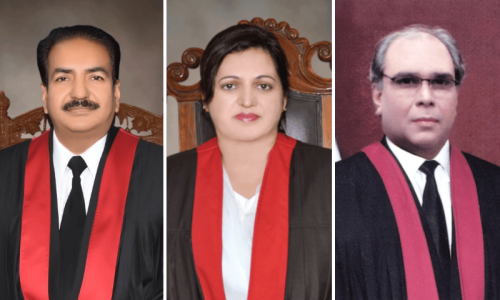KARACHI: Taking advantage of its numerical strength in the Sindh Assembly, the ruling Pakistan Peoples Party managed to get passed a controversial bill to repeal the applicability of the National Accountability Ordinance (NAO), 1999 in the province in less than two hours amid the opposition’s protest and ‘Go Zardari Go’ slogans on Monday.
The National Accountability Ordinance 1999 Sindh Repeal Bill, 2017 was tabled by Law Minister Ziaul Hasan Lanjar and Sindh Advocate General Barrister Zamir Ghumro briefed the lawmakers about the need to repeal the accountability law.
Only one lawmaker — Syed Sardar Ahmed, the parliamentary party leader of the Muttahida Qaumi Movement — spoke on the general principles of the bill in which he opposed the legislation and questioned the ruling party whether it wanted separation from the federation by passing a unilateral law. He asked the government to improve the law instead of repealing it.
Speaker Agha Siraj Durrani gave the floor to other opposition parliamentary party leaders, who insisted that the chair should allow more lawmakers to speak. The speaker rejected their demand and gave the floor to the law minister for the clause-by-clause reading of the bill.
Move to benefit PPP lawmakers, govt officials
In a mere 70 minutes, the bill was passed with a majority vote amid protest by all opposition parties — the MQM, Pakistan Tehreek-i-Insaf, Pakistan Muslim League-Functional and PML-Nawaz — which rejected the bill, lodged a noisy protest in front of the Speaker’s rostrum, tore up the copies of the bill and staged a walkout.
The new legislation, which still requires the Sindh governor’s assent to become law, repealed the NAO, better known as the NAB law, to the extent of its applicability in Sindh.
The enforcement of the bill means the National Accountability Bureau can no longer conduct inquiries or investigations into the affairs of departments or autonomous bodies being controlled by the provincial government.
It would benefit scores of politicians, including Sharjeel Memon and Dr Asim Hussain belonging to the ruling PPP, and government officials, including former Sindh Building Control Authority director general Manzoor Qadir Kaka, in Sindh, as their cases/inquiries would be transferred from NAB and accountability courts to the anti-corruption establishment and Provincial Anti-Corruption Courts, respectively.
According to the bill: “All proceedings, inquiries and investigations pending under the repealed ordinance immediately before the commencement of this Act shall stand transferred to Sindh Anti-Corruption Establishment and shall be dealt with in accordance with the provisions of Sindh Inquiries & Anti-Corruption Act, 1991 and Rules made thereunder.
“All references and legal proceedings whatsoever filed or pending before Accountability Courts under the repealed Ordinance immediately before the commencement of the Act shall stand transferred to the respective provincial anti-corruption courts of the competent jurisdiction and such courts shall proceed with the references and legal proceedings from the stage at which they were pending without the necessity of recalling any witness.
“All appeals, revisions and bail applications filed, pending or arising out of order or judgement of any court under the repealed Ordinance including High Court and Supreme Court shall continue to proceed in accordance with law applicable to appeals, revisions and bail applications arising out of order or judgement of provincial anti-corruption courts,” the bill stated.
Earlier, the law minister informed the Sindh Assembly that the government was going to introduce a new anti-corruption law in 30 days and it was trying to create a provincial accountability authority to eliminate corruption from the province.
He said that NAB law was a means of intervention by the federal government in provincial matters and that the NAB courts did not have bail powers.
In his briefing, AG Ghumro told the lawmakers that two parallel laws could not be imposed on the people of the province on the same subject and offences with respect of the provincial subjects under the Constitution.
He said it was solely within the legislative assembly competence to repeal the NAB law to the extent of Sindh.
The house also adopted two more bills — The Sindh New captive Power Plants Subsidy Bill, 2017 and The Sindh Companies Profits (Workers Participation) (Amendment) Bill, 2017 — in a short span of 10 minutes.
The one-day session of the assembly was prorogued sine die following the adoption of the three bills.
Published in Dawn, July 4th, 2017















































